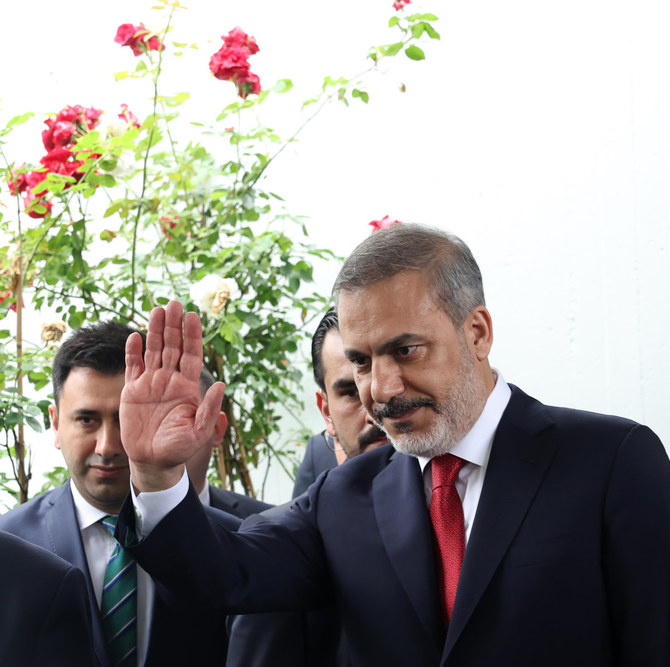Ankara adopts a trio approach in foreign policy

https://arab.news/9w684
Diplomacy and intelligence are intertwined processes: the latter provides information and the former uses it. Successful foreign policy depends on the quality and quantity of intelligence available for diplomats. There is a strong nexus between intelligence and diplomacy in several countries, including Turkiye.
After securing another term in office, President Recep Tayyip last week named his new Cabinet. Hakan Fidan, who has led the National Intelligence Organization for 13 years, is foreign minister — the second with a military background since the establishment of the Turkish republic. He is internationally well-known for his back-channel talks to improve Turkiye’s diplomatic relations in the region.
Fidan has been involved in foreign policy for the past two decades. His behind-the-scenes diplomacy played a role in Turkiye’s rapprochement with Gulf countries, Egypt, Israel, and recently even Syria. Fidan accompanied Erdoğan and previous Foreign Minister Mevlüt Çavuşoğlu on several high-profile foreign trips, including those to Gulf states. When Erdoğan visited Abu Dhabi in May last year after the death of the UAE president, Sheikh Khalifa bin Zayed Al-Nahyan, Fidan, as head of intelligence, was in the entourage. Fidanalso accompanied Çavuşoğlu on a visit to the UAE to prepare for Erdoğan’s first visit after decade-long frosty relations.
On Erdogan’s instructions, Fidan visited Egypt and Libya on several occasions to discuss bilateral ties and regional issues, and played a critical role in mending ties with Egypt and consolidating the Turkish presence in Libya. Fidan is said to have been the key actor in discussions with Israel in an effort to improve ties.
A new era of Turkish relations with the Gulf countries and others in the region is on the horizon.
Sinem Cengiz
The Syria issue is certainly one that the new foreign minister is familiar with about. Fidan met the Syrian intelligence chief several times in the lead up to the Russian-mediated political talks between Ankara and Damascus in 2022. Those meetings had two aims: first, to prepare the ground for a meeting between Turkish and Syrian foreign ministers, and second, to discuss or negotiate the situation in northern and northeastern Syria, where both parties would like to see the Kurdish militias weakened. Syria is at the forefront of the focal issues in Turkish foreign policy, from normalization with the Assad regime to the position of Kurdish militias in the north, and from border security to the repatriation of refugees.
Erdoğan said in his victory speech that Ankara was determined to put into practice the motto of the republic’s founder Mustafa Kemal Ataturk’s: “Peace at home, peace in the world” by “expanding the sphere of influence of entrepreneurial and humanitarian diplomacy, not by turning inward and watching events from the stands.” In the early 2000s, the “zero problems with neighbors policy” of the Turkish government enabled Turkiye to enhance political, cultural and economic ties with the region. Ankara’s efforts to further integration in the Middle East were welcomed and appreciated in the region until the adverse repercussions of the Arab uprisings.
In 2013, Ibrahim Kalin, chief foreign policy adviser to Erdogan when he was prime minister, introduced the term “precious loneliness” to justify Turkiye’s Middle East policy, which was much criticized at the time. “The claim of Turkiye’s loneliness in the Middle East was untrue, but if this was the claim, then I should say this is a ‘precious’ loneliness,” he said. When Kalin first used this term, a diplomatic row had broken out between Ankara and Cairo. Turkiye, which already had strained relations with Syria and Israel, had also started to see difficulties with some Gulf states. Since 2013, the mutual efforts made to restore Turkiye’s ties with Egypt, Israel and the Gulf states had not yielded any serious fruits — until the past two years, when the trajectory of Turkish foreign policy changed.
As the saying goes, a lot of water has flowed under the bridge since then. A new era of Turkish relations with the Gulf countries and others in the region is on the horizon.
In implementing the vision of a new era in Turkish foreign policy sphere, Fidan will not be alone. Kalın, a key figure in implementing the intelligence-diplomacy nexus, has replaced him as intelligence chief. Erdoğan has also appointed Mehmet Şimşek as Minister of Treasury and Finance. Şimşek is trusted name in global markets, and has a strong business network in the Gulf region.
The new Turkish foreign policy approach appears to have three tracks – economy, diplomacy, and intelligence, navigated by these three seasoned figures. None are strangers to the diplomatic world. Even if these appointments are not a clear transition in Turkish foreign policy, they signal that there will be a close connection between Turkiye’s foreign, economic and security policies.
In international relations there is a well-known argument connecting diplomatic goals with economic interests. The fusion of intelligence and diplomacy, along with economic strategies, is a new chapter in Turkiye’s evolving foreign policy.
• Sinem Cengiz is a Turkish political analyst who specializes in Turkiye’s relations with the Middle East. Twitter: @SinemCngz







































